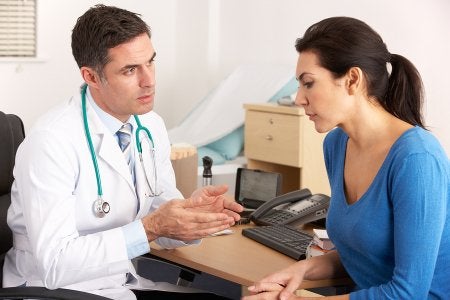-
The Importance of Pap Smears
Not every woman needs a pap smear every single year, but every woman (except those without a cervix) should get them on a regular basis. Your gynecologist will let you know how often you should have this important preventive health screening. Pap smears involve taking a sample of cells from the cervix and examining them in a lab. The purpose is to identify potentially abnormal changes of the cervix, called cervical dysplasia. If abnormal changes are detected, the patient can receive treatment before the abnormality develops into cervical cancer.

Pap smears are uncomfortable, but they shouldn’t be painful. If you’ve been avoiding pap smears because of an unfavorable experience in the past, you should find a gynecologist you can trust. Talk to the doctor about your concerns. As advocates of women’s health, gynecologists generally want to do everything possible to help their patients have a stress-free, positive experience.
At Washington Surgi-Clinic, we’re known for our warm and caring professionals , whom you can consider your partners in health. Call (202) 659-9403 to schedule your next pap smear in Washington, D.C.
-
Spotting the Signs of Chlamydia
Chlamydia is a bacterial infection that can be transmitted via oral, anal, and vaginal sex, and even through skin to skin contact. Chlamydia is quite common, and women often don’t realize they have it because symptoms don’t always occur. If you’re sexually active, consider talking to a gynecologist about STD testing.
Watch the accompanying video to learn the signs of chlamydia. This doctor explains the symptoms in both men and women. For women, the red flags include abnormal vaginal discharge, pelvic pain, pain during sex, and bleeding between periods. For this particular STD, the treatment is a course of antibiotics.
Washington Surgi-Clinic offers confidential STD testing services in Washington, D.C. You can call our women’s health clinic at (202) 659-9403 to request an appointment with one of our compassionate gynecologists.
-
Preparing for a Second Trimester Abortion
A second trimester abortion is performed any time between 12 and 26 weeks. This is past the point at which a woman can have a medical abortion with medications, and so a minimally invasive procedure is necessary. When you speak with your gynecologist about pregnancy termination, she will give you all the information you need to prepare for the procedure and have a healthy recovery.

Consultation and Exam
A second trimester abortion can usually be performed in two visits, although sometimes three visits are needed. Occasionally, just one visit is necessary. First, you’ll speak with the gynecologist about the procedure. Take your time learning about it and what you can expect, and ask any questions you have. You’ll have a physical exam, including an ultrasound exam.
Medications and Alcohol Use
You may be asked to adjust your medication dosage schedule, if applicable. Let the gynecologist know about all over-the-counter (OTC) and prescribed medications you’re using, along with your supplements, if applicable. Some medications can interfere with blood clotting, and you may be asked to temporarily discontinue these. You should also avoid alcohol use for 24 hours prior to the procedure.
Laminaria Insertion
Laminaria sticks are thin, sterile rods made of seaweed. Your doctor may need to insert them into your cervix and leave them there overnight before performing the rest of the procedure the next day. They work by gently dilating the cervix . If you’ve taken a prescription pain reliever or anti-anxiety medication for the laminaria insertion, someone else will need to drive you home. You’ll be asked to avoid eating or drinking anything after midnight. A responsible adult should drive you to the clinic the next day. Before your procedure, you’ll have your choice of local, conscious, or general anesthesia.
Women choose Washington Surgi-Clinic because of our commitment to the highest standards of patient care and safety. Our abortion providers in Washington, D.C. are highly trained, board-certified doctors who firmly believe in giving each patient the compassionate and respectful care she deserves. Schedule an appointment today by calling (202) 659-9403.
-
Which STDs Can Affect Your Fertility?
Fertility can be a sensitive topic for women, whether or not they’re actively trying to conceive a child. But you should feel comfortable discussing any aspect of your sexual and reproductive health with your gynecologist . Your doctor genuinely cares about your well-being, and will gladly answer your questions about sexually transmitted diseases (STDs) and how they might affect fertility.

Chlamydia
This is one of the most commonly transmitted STDs. It’s caused by a bacterial infection. Since many people with chlamydia never experience symptoms, it’s easy to spread it to a partner without realizing it. Women who are sexually active can request STD testing to find out if they might have chlamydia. This is especially important if they intend on conceiving a child someday, as chlamydia can adversely affect fertility by spreading to the fallopian tubes. The fallopian tubes may develop scar tissue, which interferes with the transfer of the egg, or they can become blocked altogether. The complications of chlamydia can also increase the risk of ectopic pregnancy, which is a life-threatening emergency that requires prompt medical intervention.
Gonorrhea
Like chlamydia, gonorrhea is spread by a bacterium and often causes no symptoms. If left untreated, gonorrhea can affect many areas of the body, including the eyes, throat, joints, and rectum. It can also cause infertility in both men and women. Women with untreated gonorrhea can develop pelvic inflammatory disease (PID) and scar tissue in the fallopian tubes. If women are able to get pregnant, gonorrhea increases the risk of pregnancy complications.
Pelvic Inflammatory Disease (PID)
PID isn’t just caused by gonorrhea. It can also be a complication of chlamydia and other STDs. Additionally, many other bacterial infections that aren’t sexually transmitted can lead to PID. PID can inflict damage on a woman’s reproductive organs . It can also cause chronic pelvic pain, tubo-ovarian abscesses, and ectopic pregnancy. The longer PID is left untreated, the greater the risk of complications is.
Washington Surgi-Clinic is a modern medical facility that provides gynecology services in Washington, D.C. Our board-certified physicians are committed to providing exceptionally courteous and respectful care, which includes STD treatment. Call (202) 659-9403.
Recent Posts
Popular Posts
categories
- Uncategorized
- STD
- Washington Surgi-Clinic
- Abortion
- Pregnancy
- Pap Smears
- Birth Control Options
- HPV
- Gynecologist
- Pregnancy Test
- Abortion Safety
- IUD
- Pregnancy Termination
- First Trimister
- Cervical Cancer
- Morning After Pill
- Birth Control Pills
- Chlamydia
- Birth Control Shot
- Gonorrhea
- STD Testing
- Birth Control Implant
- Pelvic Pain
- Birth Control Patch
- HIV
- HPV Vaccine
